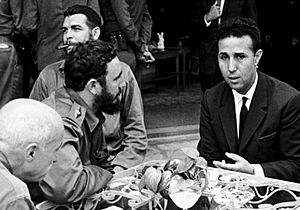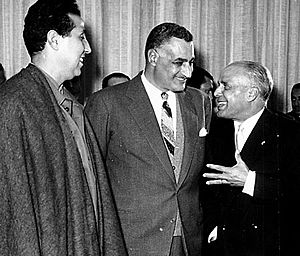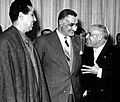Ahmed Ben Bella facts for kids
Quick facts for kids
Ahmed Ben Bella
|
|
|---|---|
|
أحمد بن بلّة
|
|
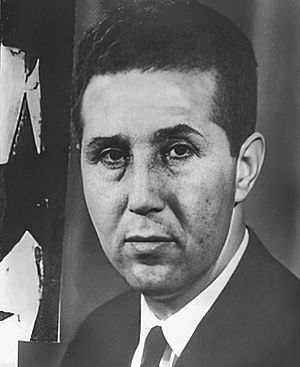
Official portrait, 1963
|
|
| 1st President of Algeria | |
| In office 15 September 1963 – 19 June 1965 |
|
| Vice President |
|
| Succeeded by | Houari Boumédiène as Chairman of the Revolutionary Council |
| Prime Minister of Algeria | |
| In office 27 September 1962 – 15 September 1963 |
|
| Preceded by | Benyoucef Benkhedda as Head of Government |
| Succeeded by | Office abolished Mohamed Ben Ahmed Abdelghani (1979) |
| Personal details | |
| Born | 25 December 1918 Maghnia, French Algeria |
| Died | 11 April 2012 (aged 93) Algiers, Algeria |
| Political party | FLN |
| Spouse |
Zohra Michelle Sellami
(m. 1971; died 2008) |
| Children | 2 |
Ahmed Ben Bella (Arabic: أحمد بن بلّة Aḥmad bin Billah; 25 December 1918 – 11 April 2012) was an important Algerian politician and soldier. He was a socialist revolutionary who fought for Algeria's freedom. He served as the first head of government from 1962 to 1963. Then, he became the first president of Algeria from 1963 to 1965.
Contents
Early Life and Education
Ahmed Ben Bella was born on December 25, 1918, in Maghnia, western Algeria. This was during a time when France ruled Algeria. His parents were from Morocco.
His father was a farmer and a small business owner. Ahmed had five brothers and two sisters. He started school in Maghnia, attending a French school. Later, he continued his studies in Tlemcen.
In Tlemcen, he noticed how Muslims were treated differently. His European teacher showed prejudice against them. This made him upset with imperialism and colonialism. He felt that French culture was too dominant in Algeria. During this time, he joined the nationalist movement. This movement aimed for Algeria's independence.
Serving in the French Army
Ben Bella joined the French Army in 1936. For Algerians, joining the army was one of the few ways to get ahead. Many Algerians volunteered. He was sent to Marseille.
He also played football for Olympique de Marseille in 1939–1940. He played one game in the French Cup and even scored a goal. The club offered him a professional contract, but he said no. He also played for IRB Maghnia.
Ben Bella joined the army again in 1940. He believed it was a place where Algerians might be treated fairly. He fought for France in World War II. He earned two awards for his bravery. One was the Croix de Guerre in 1940.
He was honored for his bravery at the Battle of Monte Cassino in Italy. He rescued a wounded officer and took charge of his group. For this, he was promoted and received the Médaille militaire. This was a very high award from the Free French forces. Charles de Gaulle himself gave him the medal.
On May 8, 1945, France celebrated the end of the war in Europe. But in the Algerian town of Sétif, protests broke out. The war had made colonial rule even harsher for Algerians. This led to violence, and many Algerians died. This event deeply affected Ben Bella and other Algerians. They realized France would not treat them equally, despite their service in the war.
The Road to Independence
Organizing for an Uprising
After the events in Sétif, Ben Bella returned to Algeria. He became very active in the movement against French rule. French authorities tried to harm him on his farm, but he escaped. His farm was taken away, and he went into hiding.
Nationalist parties did well in local elections in 1947. But then, French officials rigged the 1948 Algerian Assembly elections. This made Ben Bella believe that peaceful independence was not possible. He helped create the Organisation Spéciale (OS). This was a secret group that planned to fight the French. It was a key step towards the National Liberation Front.
In 1949, Ben Bella was involved in getting funds for the OS. He was caught in 1951 and sent to prison. But he escaped soon after. He went to Tunisia and then to Egypt, arriving in Cairo by 1952.
When the Algerian War began in 1954, Ben Bella was in Cairo. He was one of nine leaders of the Revolutionary Committee of Unity and Action. This group led the Front de Liberation Nationale (FLN). The FLN started an armed rebellion against the French. This grew into a large guerrilla war in Algeria.
During the Algerian War
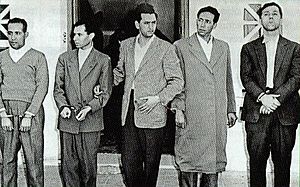
Ben Bella played a vital role during the war. He led the FLN, arranged for weapons from other countries, and planned political actions. Even though he was not in Algeria, there were attempts to harm him. In 1956, a dangerous incident occurred with a bomb in a taxi in Cairo.
Later that year, he was wounded by a French gunman in Tripoli. In October 1956, French military forces arrested him. They took control of the plane he was flying on. He remained a prisoner until the Evian accords in 1962. He was released on July 5, 1962.
After Algeria gained independence, he became vice president. Like many Arab revolutionaries, he admired Nasser of Egypt. He built strong ties with Egypt. Egypt's support for Algeria caused problems with France during the 1956 Suez Crisis.
Pakistan also supported the FLN. Ben Bella was given a Pakistani diplomatic passport. This helped him travel safely while the French searched for him internationally. He also used this passport when he lived outside Algeria in the 1980s.
Algerian Independence and Leadership
Ben Bella's Government and Reforms
After Algeria became independent, Ben Bella quickly became a popular leader. In June 1962, he challenged the current leader, Benyoucef Benkhedda. This led to disagreements within the FLN. But Ben Bella had strong support, especially from the army, led by Houari Boumédiène. Boumédiène marched his troops to Algiers. Ben Bella took power on August 4, 1962.
By September 1962, Ben Bella was in control of Algeria. He was elected prime minister in an election on September 20. The United States recognized his government on September 29. Algeria became the 109th member of the United Nations on October 8, 1962.
As prime minister, Ben Bella made it legal for Algerian workers to take over former European-owned lands. In March 1963, he officially nationalized all these lands. He believed that independence meant nothing if Algerian land was still owned by a few large landowners.
He pushed for a new constitution written by the FLN. This constitution created a one-party state, meaning only one political party was allowed. Some allies, like Mohammed Khider and Ferhat Abbas, resigned because they disagreed with this. However, the Algerian people approved the constitution. On September 15, 1963, Ben Bella was elected president without opposition.
During his presidency, Ben Bella faced the challenge of building a new country. Algeria had no independent government traditions. French officials had always run the government. Ben Bella wanted to govern fairly and live simply. He kept his door open to Algerian citizens.
He started land reforms to help farmers who had no land. These reforms were popular at first but were handled somewhat chaotically. He also used more socialist ideas in his speeches. His policy of "autogestion," or self-management, allowed peasants to take over former French farms. This idea was inspired by Josip Broz Tito of Yugoslavia.
He also worked to develop Algeria. He started campaigns to teach people to read and write. He took control of several industries for the government. He also pushed for the use of the Arabic language. Sometimes, he made up government policies as he went along. For example, he asked Algerians to "voluntarily" donate jewelry and money for a National Solidarity Fund.
International Relations and Challenges
In foreign policy, he kept ties with France, the former colonial ruler. He also accepted money from both the United States and the Soviet Union. Both countries wanted Algeria to be on their side during the Cold War. Ben Bella wanted Algeria to be a leader for Third World liberation movements.
Algeria joined the Non-Aligned Movement under his rule. This movement included countries that did not side with either the U.S. or the Soviet Union. He made friends with African leaders like Gamal Abdel Nasser and Kwame Nkrumah. He aimed to help rebel movements across Africa.
He also built good relations with Fidel Castro and Che Guevara from Cuba. After his visit in 1962, Cuba sent doctors and medical aid to Algeria. Later, Cuba sent weapons and soldiers to help Algeria during the Sand War against Morocco. On April 30, 1964, he was given the title Hero of the Soviet Union.
Ben Bella faced political challenges from other FLN leaders. These included Mohammed Khider, Ferhat Abbas, Mohammed Boudiaf, and Hocine Aït Ahmed. Ahmed started a group called the Socialist Forces Front (FFS) to oppose Ben Bella. Others joined after feeling that Ben Bella was becoming too dictatorial. In 1963, the FFS called for an armed uprising. However, this revolt was mostly in the Kabylie region and was stopped by 1964. FFS leaders were arrested.
He also faced opposition from religious groups. The Association of the Algerian Ulema said that Ben Bella's "state Islam" was not true to Muslim values. They believed it was just an attempt to please the public.
His government was overthrown in June 1965. This was a bloodless coup led by his defense minister, Houari Boumédiène. Ben Bella was held in prison for eight months. Then, he lived under house arrest for the next 14 years.
House Arrest and Later Freedom
After being removed from power in 1965, Ben Bella was held in prison for eight months. He was then moved to a secluded house in Birouta. Here, he was under house arrest for 14 years. However, he was allowed to have a private life.
In 1971, he married Zohra Sellami, an Algerian journalist. His mother arranged their meeting. They became devout Muslims and adopted two girls, Mehdia and Nouria. After Boumédiène died in 1978, the restrictions on Ben Bella were eased in July 1979. He was finally freed on October 30, 1980.
Ben Bella lived briefly in France but was expelled in 1983. He then moved to Lausanne, Switzerland. In 1984, he started a moderate Islamic opposition party called the Mouvement pour la Démocratie en Algérie (MDA). In September 1990, he returned to Algeria. In 1991, he led the MDA in the first round of parliamentary elections, which were later canceled. The MDA party was banned in 1997.
Later Life and Legacy
In 2003, Ben Bella was chosen to be the president of the International Campaign Against Aggression on Iraq. He often described himself as a "mild and peace-loving" Islamist. Even though he once led a one-party state, he later strongly supported democracy in Algeria. He believed that extreme groups in the Islamic world misunderstood Islam.
Despite some disagreements, he was respected for his role in fighting against colonial rule. Many Arab thinkers saw him as one of the last true Arab nationalists.
He also chaired the African Union Panel of the Wise. This group advises the African Union on how to prevent and resolve conflicts. Other members included former presidents and important figures from African countries.
Illness, Death, and Funeral
In February 2012, Ben Bella went to the hospital for medical checks. There were rumors that he had died, but his family denied this.
Ahmed Ben Bella passed away on April 11, 2012, at his home in Algiers. The exact cause of his death was not announced. However, he had been treated for breathing problems twice before. His body was displayed on April 12. The funeral took place at El Alia Cemetery on April 13. Algeria declared eight days of national mourning to honor him.
Leaders at the State Funeral
| Country | Title | Dignitary |
|---|---|---|
| Prime Minister | Moulaye Ould Mohamed Laghdaf | |
| Prime Minister | Abdelilah Benkirane | |
| President | Mohamed Abdelaziz | |
| President | Moncef Marzouki |
Images for kids
See also
 In Spanish: Ahmed Ben Bella para niños
In Spanish: Ahmed Ben Bella para niños
 | Laphonza Butler |
 | Daisy Bates |
 | Elizabeth Piper Ensley |


